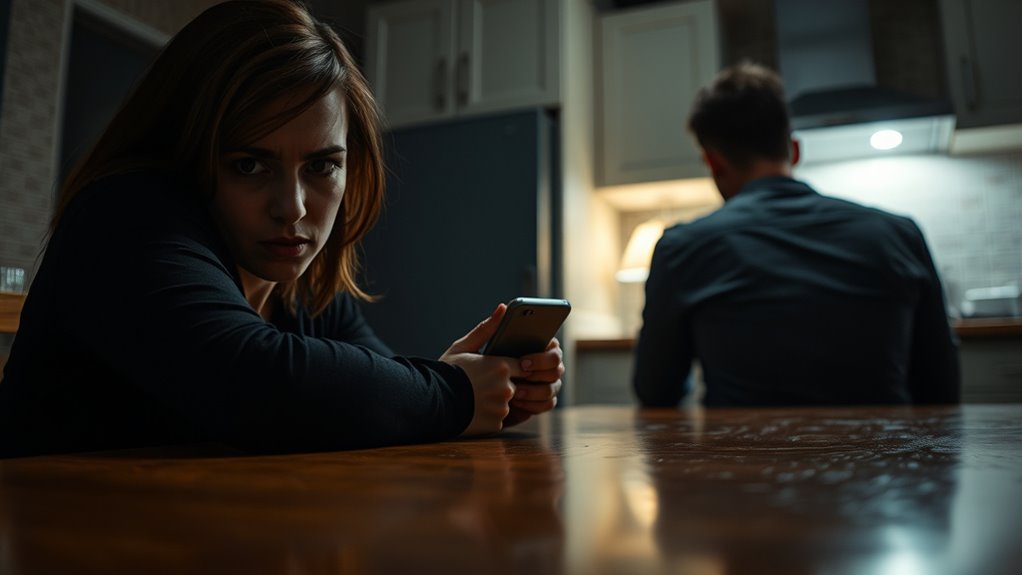Trust your gut when you suspect cheating, but it’s important to balance intuition with facts. Notice if your partner avoids eye contact, becomes overly defensive, or acts secretive—these signals can point to issues. However, emotional intuition can also be influenced by insecurities or past experiences. Approach suspicions calmly and ask questions respectfully rather than jumping to conclusions. If you’re willing to explore how to trust your instincts wisely, there’s more to contemplate that can help you make better decisions.
Key Takeaways
- Trust your feelings but differentiate between genuine concerns and insecurities or biases.
- Look for consistent patterns or behaviors that reinforce your intuition before investigating.
- Approach suspicions with calm, honest communication rather than impulsive accusations.
- Avoid unnecessary snooping; prioritize transparency and open dialogue to address concerns.
- Use your gut as a guide to decide whether to seek clarity or consider other relationship options.

Have you ever faced a tough choice and felt an instinctual nudge guiding you in one direction? That feeling is often your emotional intuition at work, an internal signal that something might be off. When it comes to relationships, this gut feeling can be especially powerful. You may notice signs of suspicion creeping in—small inconsistencies in your partner’s stories, unexplained absences, or suddenly secretive behavior. These clues can trigger your emotional intuition, making you question whether something’s happening behind your back. Trusting that inner voice isn’t always easy, but it’s important to pay attention to what your instincts are telling you.
Your gut feeling about your partner’s behavior is your emotional intuition warning you to pay attention.
Your emotional intuition acts as an early warning system, alerting you to potential issues before they become obvious. It’s not about jumping to conclusions but about recognizing patterns that don’t sit right with you. These signs of suspicion might include your partner avoiding eye contact, being overly defensive, or hiding their phone or messages. You might feel a sense of unease or a nagging doubt that’s hard to shake, even if you don’t have concrete proof. These feelings are normal, and they shouldn’t be dismissed. Instead, they’re signals that you need to look deeper, gather more information, and consider what your gut is trying to tell you. Sometimes, understanding your emotional intuition can help you distinguish between genuine concerns and unfounded fears, allowing for a more measured response.
However, it’s pivotal to differentiate between genuine signs of suspicion and mere paranoia. Your emotional intuition is valuable, but it can also be influenced by past experiences, insecurities, or fears. When you notice these signs of suspicion, take a moment to assess your feelings and the facts objectively. Ask yourself if there’s concrete evidence or just a sense of discomfort. Sometimes, your mind can fill in gaps with worst-case scenarios, so it’s wise to remain calm and rational. Trusting your gut doesn’t mean acting impulsively; it means being attentive and thoughtful about what you’re sensing. Remember that confirmation bias can sometimes amplify suspicions, so approaching the situation with an open mind is essential. Developing awareness of cognitive biases can help you stay grounded and make better decisions based on facts rather than assumptions.
If your intuition keeps nudging you, it might be time to gently confront your partner or seek clarity. Investigating your suspicions doesn’t necessarily mean snooping or accusations. Instead, it involves honest communication, expressing your feelings without blame, and seeking transparency. Your emotional intuition is a guide, but it’s how you respond—through calm, respectful inquiry—that determines whether your concerns are valid. Trusting your gut includes understanding that skincare patches are a helpful tool for targeted treatment, just as clear communication is essential in addressing relationship concerns. Ultimately, listening to your gut can help you decide whether to trust your partner or to explore other options. It’s about honoring your feelings while remaining fair and rational in your approach. Recognizing the importance of water-related signs in your feelings can also help you stay balanced emotionally during this process.
Frequently Asked Questions
How Can I Tell if My Intuition Is Accurate?
To determine if your intuition is accurate, trust your instincts but also confirm your feelings with facts. Pay attention to consistent signs and patterns that support your gut feelings. Avoid jumping to conclusions, and take time to gather evidence before acting. Recognizing when your intuition aligns with reality helps you make informed decisions, reducing unnecessary stress. Trusting your instincts is helpful, but verifying feelings ensures you’re not reacting to assumptions.
What Are Signs My Partner Might Be Cheating?
Did you know that 75% of people report feeling suspicious before discovering infidelity? If you’re sensing trust issues, your emotional intuition might be alerting you to something deeper. Signs like sudden secrecy, changes in communication, or unexplained absences could point to cheating. Trust your instincts, but also look for consistent patterns. Investigating these signs can help you find clarity and protect your emotional well-being.
Is It Better to Confront or Investigate First?
When deciding whether to confront or investigate first, trust versus suspicion plays a key role. If your gut instincts strongly signal something’s off, it’s wise to gather more evidence before directly confronting your partner. Investigating calmly helps you avoid false accusations and clarifies your feelings. Ultimately, trusting your intuition can guide your actions, but ensuring you have enough facts helps you approach the situation thoughtfully and confidently.
How Do I Handle Suspicion Without Proof?
Imagine your suspicion is a roaring lion, and you’re stuck in a cage of privacy boundaries. You feel overwhelmed, but rushing to accuse without proof can backfire. Instead, assess your emotional readiness—are you prepared for the truth? Respect your boundaries and give yourself space to process. Trust your intuition, but avoid jumping to conclusions. Handling suspicion carefully helps protect your emotional well-being and keeps your relationship intact.
When Should I Seek Professional Help?
When should you seek professional help? Trust your emotional intuition and gut feelings—they can signal deeper issues in your relationship. If your suspicions persist despite evidence or if your emotions become overwhelming, it’s time to get support. A counselor or therapist can help you process your feelings, clarify your thoughts, and guide you through difficult conversations. Don’t ignore these signals; professional guidance can provide clarity and emotional relief.
Conclusion
When your gut whispers doubt, it’s like a flickering lighthouse guiding you through a stormy night. Ignoring it risks sailing blindly into danger, while investigating sheds light on the shadows lurking beneath. Trust your instincts as you would trust that steady beam, leading you toward clarity and truth. Sometimes, the smallest spark of suspicion can ignite a brighter understanding, helping you navigate the choppy waters of doubt with courage and conviction.









